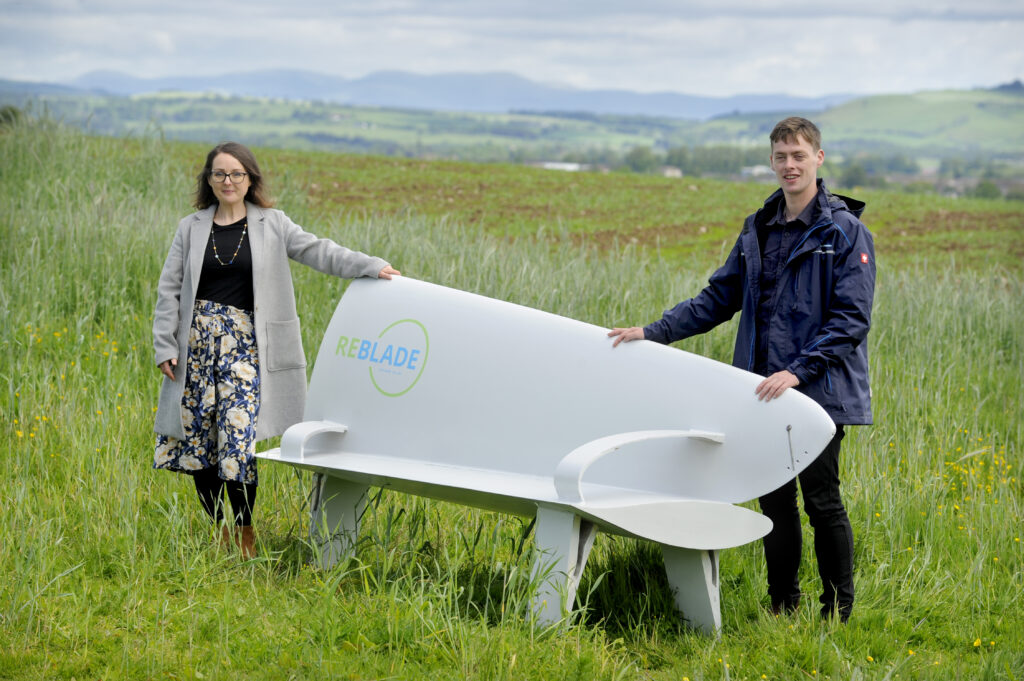A SCOTS business has partnered with a renewable energy company to explore the solutions for reusing wind turbine blades.
Wind turbine decommissioning service ReBlade – based in Glasgow – has today announced its collaboration with renewable energy generator Fred. Olsen Renewables (FOR).
The companies are hoping to find a use for the turbine blades from Windy Standard Wind Farm, near Carsphairn in Dumfries and Galloway.
FOR is proposing to repower the first phase of the wind farm, which would see the removal of 36 turbines and up to eight wind turbines erected in their place.

The decommissioning process will thus release various materials, including more than 100 turbine blades.
A focus for the organisation is identifying solutions to repurpose or recycling the blades.
Whilst wind turbine blades can prove to be difficult to recycle and repurpose, the partnership aims to explore opportunities to create items for use in the local area from the blades, such as playparks, bus shelters and bike racks.
The initiative embraces the circular economy, ensuring that the renewables sector is as green as it can be, whilst supporting jobs in the region and Scotland-wide.
Miles McConville, Project Manager at FOR, commented: “Windy Standard Wind Farm has been operating for over 25 years and was one of the first wind farms to be built in Scotland. It will also be one of the first to be repowered.
“We want our repowering proposals to celebrate this legacy and this includes making sure that our proposals lead the way in identifying solutions for the recycling and repurposing of turbine blade materials.
“Working with Reblade will allow us to explore opportunities to repurpose turbine blades that are removed from site and give them a second lease of life in the local area.
“We are engaging with the local community to find out what they would like to see delivered, and, should our plans be approved, we hope to bring some of those ideas into fruition.”
The partnership was marked by the signing of a memorandum of understanding between the two companies on one of ReBlade’s furniture designs.
The table and bench are made from decommissioned turbine blades, which flew many millions of miles during their operational lifespans, generating green electricity.
The items are examples of the types of products that could be designed from the decommissioned Windy Standard blades.
Fiona Lindsay, Technical Director of ReBlade, based in Glasgow, said: “This collaboration should help to establish best practice in the wind energy sector in the UK by prioritising the development of sustainable decommissioning methods at a very early stage in the site repowering process.
“The non-recyclable nature of wind turbine blades is a known issue, and it’s one we’ve been actively exploring with partners in the industry.
“It’s great to be working with an innovative company like FOR in pioneering scalable solutions that prioritise the circular potential of Scotland’s green energy assets.
“I want to help determine a useful second life for these materials rather than seeing them being landfilled in turbine blade graveyards.
“Our priority is developing practical, workable solutions, and to do so in a way that creates local jobs and benefits local communities.”
Douglas Chapman MP and SNP Spokesperson for SMEs, Enterprise, Innovation said: “This collaboration is a hugely significant moment in Scotland’s renewable journey.
“As the first specialist wind turbine blade decommissioning service in the UK, Scottish company ReBlade are rooted in renewable and circular economy principles.
“Their collaboration with FOR is an important example of waste management, local benefit through job creation and skills development as well as second-life design.
“It’s exactly this kind of unique opportunity in green innovation that we need to celebrate and support as well as replicate across renewable sectors in Scotland in order to meet our net zero ambitions.”
